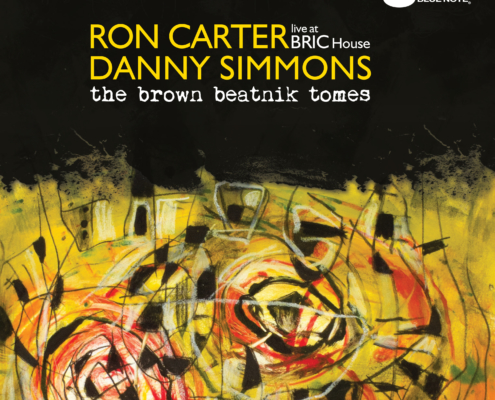Ron Carter & Danny Simmons – The Brown Beatnik Tomes
Jazz trifft Lyrik: Bass-Legende Ron Carter und bildender Künstler und Autor Danny Simmons trafen im Rahmen des New Yorker BRIC JazzFest zu einem einmaligen Event zusammen. Simmons las mit einer packenden Mischung aus Wut und Zärtlichkeit aus seiner Gedichtesammlung “The Brown Beatnik Tomes“, während Carter ihn improvisierend am Kontrabass begleitete und so zu einer kongenialen zweiten Stimme wurde. Ein ungewöhnliches Projekt, das Grenzen sprengt – jetzt als Live-Mitschnitt.
RON CARTER AND DANNY SIMMONS
One autumn night in Brooklyn, two giants took the stage to perform a kind of alchemy: turning raw-plucked bass lines and hotly read poetry into something that rang with meaning and felt like magic. On the rhythm side: Ron Carter, 81, who not only played in Miles Davis‘ Second Great Quintet but, with well over 2,200 (frequently legendary) sessions to his name, is the Guinness-certified most-recorded jazz bassist in history. And on the words: Danny Simmons, Tony-winning cofounder of Def Poetry Jam, not to mention a novelist, poet, gallerist, and neo-African abstract expressionist whose paintings have appeared in the Smithsonian and the United Nations HQ. What they created that night was, and still is, called The Brown Beatnik Tomes. It began as a book, became an event, and is now an album. But what it really is, is an irresistible concept.
„I was trying to imagine myself as a Beat Generation poet in the ’50s,“ says Simmons, „and how my concerns would be a bit different from Lawrence Ferlinghetti’s or Allen Ginsberg’s. In a way, the beatniks romanticized black people. They were hip, but they didn’t really see the plight. That scene largely was about the Negro experience but didn’t have the Negro in it.“ Thus, the pieces that appear here match the visual language, jazz patter, and energetic immediacy of the best of the Beats — Ginsberg’s Howl is one of Simmons‘ all-time favorites — but the point of view has shifted 180 degrees, from voyeur to source. And who better to accompany this remix of history than a man who lived through it — Carter was in his 20s, working in New York, during the era.
„I was not participating in the Beat movement,“ says the man who’s played on radical albums by Gil Scott-Heron and A Tribe Called Quest alike. „Those were white guys saying what they were saying. I was involved in the black community, playing with people like [folk singer] Leon Bibb. A similar thing was happening there, and my music was trying to support that.“ Here, Carter finds himself continuing that tradition, walking his bass ever so off-kilter beneath lines like (from the titular track): „I dreamed I saw Bob Dylan pay homage to an effigy of LeRoi Jones on burning Newark streets rattling a necklace of harmonicas at passersby on slave ships roaring down the streets of history, jig dancing for loose change and selling lines of poems for a pittance’s sake.“
Simmons and Carter aren’t alone on The Brown Beatnik Tomes – Live at BRIC House. Carter’s trio, rounded out by pianist Donald Vega and guitarist Russell Malone, assembles for a pair of instrumentals including the breezy, palate-cleansing „Here’s to Oscar“ (a tribute to pioneering bebop bassist Oscar Pettiford). And Simmons was, in a way, accompanied by his paintings — which are paired with the poems in the Brown Beatnik Tomes book — as they were projected behind him. Also, playwright, actor, and Def Poetry alum Liza Jessie Peterson (The 13th, The Peculiar Patriot), brings her spoken word to the mesmeric „Where Do I Begin,“ an epic rebuke of a system that openly embraces and benefits from black culture while simultaneously treating that culture’s creators as disposable or, even worse, threats that ought to be eliminated.
Throughout, the music feels both perfectly composed for every poem and also completely in the moment. That’s the Ron Carter touch. „I hear the rhythm and cadence in my head when I write,“ says Simmons. „To stand up there and have to reproduce that with somebody as accomplished as Ron was a little… I’m going to say ‚terrifying.‘ Basically, I let him do his thing and I followed.“ But Simmons takes listeners on a journey too. Right out the gate, we get „For a Pistol,“ a stirring resurrection of, and dedication to, the revolutionary spirit of beatnik contemporary Amiri Baraka (f.k.a. LeRoi Jones). Later we hear „Feeling It Coming On,“ where visceral inspiration flows after a night of escape into dance. Then comes „Tender,“ where the bass softens as Simmons waxes sensual, blurring a romantic vision of all-natural Africa into the treacle of American indulgence.
During the longest piece, „The Jigaboo Waltz,“ you can hear the audience travel with Simmons as he connects cultural dots from UPN to 9/11 to Barbie dolls to Gone With the Wind, in one moment chuckling at his shuck-and-jive impression and in another falling deathly silent as he articulates the current of anger running beneath that smiling surface: „Only this pen keeps the gun from my head… or better yet yours.“ On „The Final Stand of Two Dick Willie,“ we meet a character whose perspective appears elsewhere in The Brown Beatnik Tomes (and in Simmons‘ 2018 book, The Return of Two Dick Willie) even when he’s not named. He is, as Simmons puts it, „the quintessential black man experiencing the decades of progress or failure. You see who we have been through his eyes on his journey through America, carrying his guitar with him.“
Even if the art came from a place of spontaneity, the themes are rooted in historical soil and intertwined with our modern landscape. Simmons and Carter built in moments for listeners to digest all of this. To wit, after Peterson’s poem, which lists Americans of color who have died at or in the hands of police or vigilantes, the Ron Carter Trio returns to perform 1942’s „There Will Never Be Another You.“ The title works as a eulogy to those lost lives, but the warm sound is also meant to convey something else. „I hadn’t seen that kind of response to poetry and music in many many years,“ says Carter. „We played that song at a slow uncomplicated tempo so the audience could understand that we’re thanking them for their presence and we treat them not just as a group but as individuals — there will never be another you, plural and singular.“
One night in Brooklyn, two giants took the stage. There may never be another evening exactly like it, but what Simmons and Carter created echoes, like a howl, for as long as we’ve got ears.
Radio-Kontakte
Media Promotion (Promotion Süd, West & Nord)
Rosita Falke
Tel: 040 – 413 545 05
info@rosita-falke.de
Musicforce
Anja Sziedat (Promotion Berlin / Ost)
Tel: 030 – 419 59 615,
Mobil: 0177 – 611 5675
anja.musicforce@gmail.com
Blue Note/ CD 00602577524547 / Vertrieb: Universal
Veröffentlichung: 07.06.2019

